FROM January 24th, 2020
“I strongly agree with Professor Klaus Schwab, Founder-Chairman of the World Economic Forum, that we can accelerate progress as stakeholders for a cohesive and sustainable future. Around the world, people are revolting against the economic elites, which they have believe have betrayed them. Water, sanitation and hygiene results are falling dangerously behind and nowhere is inequality more stark than in the health conditions of women, children, and adolescents. Yet when women lead, change happens – in Nigeria, between 2010 and 2015, we measured a 35% increase in maternity survival due to the introduction of the Midwives Service Scheme which saw 4400 more midwives deployed within the public health system. As the world unites to celebrate this 2020 Year of the Nurse and Midwife, I hope to mobilise support and resources for midwifery competencies, to demonstrate safer birth solutions for healthy futures for all within the Davos Manifesto 2020.” – Toyin Saraki, Founder-President of the Wellbeing Foundation Africa, made a series of interventions at the World Economic Forum’s Annual Meeting this week in Davos, Switzerland.
This year’s meeting, which focuses on the theme ‘Stakeholders for a Cohesive and Sustainable World,’ brought together nearly 3,000 participants from 117 countries, including 53 heads of state and leaders from business, civil society, academia, media and the arts. This year’s annual meeting coincides with the International Year of the Nurse and Midwife, as dedicated by the World Health Organization – a year in which Mrs Saraki, as the Global Goodwill Ambassador of the International Confederation of Midwives, is committed to uniting, mobilising, demonstrating, and celebrating midwife competencies as frontline professionals crucial to achieving universal health coverage.
This week at Davos, Mrs Saraki, who commented “As a member of the United Nations and African Union’s Africa Women Leaders Initiative, we know that we examine our goals and progress through our gender lens” also participated in a series of high-level gender and diversity initiatives aiming to build progress towards the achievement of Sustainable Development Goal Five: Gender Equality. These include the ‘100,000 Women Campaign’: to transform the lives of over 100,000 women entrepreneurs in Lower and Middle-Income Countries by 2022, of the Cherie Blair Foundation; a fireside discussion on equality in the workplace hosted by the Female Quotient and Boston Consulting Group; the launch of British Vogue’s ‘Forces for Change’ hosted by Vanessa Kingori MBE and Natalia Vodianova as a previous awardee of the United Nations Fashion for Development Age of Humanity Award, and ‘When Women Lead, Change Happens’ hosted by UNAIDS and Reckitt Benckiser to discuss the role of educating women around sexual health, bringing health ministers, academics and business leaders together to collaborate on the realities of HIV/AIDS for young women and girls in sub-Saharan Africa.
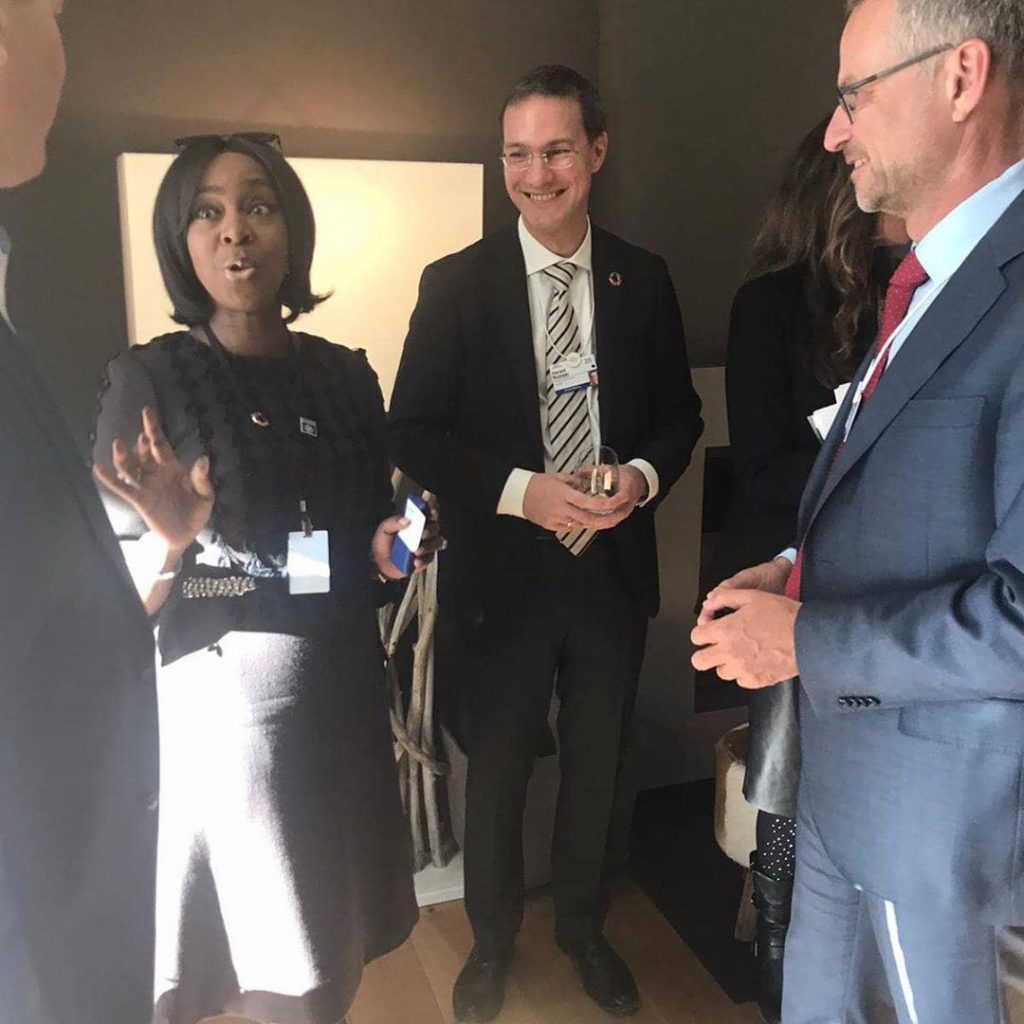
Mrs Saraki, who initiated the “Clean Hands Save Lives” global advocacy campaign to improve water, sanitation and hygiene (WASH) conditions alongside the World Health Organization and other partners in 2018, addressed a high-level gathering on water scarcity and safety. The “Safe Water Saves Lives” panel with Reckitt Benckiser (RB) highlighted the success seen in water sanitation projects in India and Nigeria and how this can be leveraged in other water-critical countries.
Mrs Saraki was joined by Karin Maria Krchnak, Head of Water Resources Group 2030 at The World Bank, Trisha Shetty, Founder, SheSays, Gary White, Founder & CEO of Water.org, Chinenye Monde-Anumihe, social justice and human rights activist and WEF Global Shaper, and Alice Moore, the brand lead for Harpic.
Mrs Saraki commented during her speech at the event:
“2020 must mark the beginning of a decade of action for the global community. We have only ten years left to achieve the Sustainable Development Goals, and it is twenty-five years since the adoption of the Beijing Declaration and Platform for Action. We must honestly appraise the progress that we have made so far and appraise where we are still falling short.”
“Standards of water, sanitation and hygiene in Nigeria and globally continue to represent a major challenge. I welcome recent achievements and milestones, in particular WHO resolutions and country commitments, but WASH is one area where ‘business as usual’ is simply not good enough.”
“Since April 2018 when the Wellbeing Foundation Africa introduced new WASH in schools and hygiene in health care facilities and households programs, while advocating to reduce open defecation, we have measured considerable impact which gives us the courage to now insist on a rapid acceleration of our best-practice models engaging midwives as sanitation angels, to national scale.”
“As I reflect on the past few years of World Economic Forum meetings, my thinking has evolved: and it has become more widely accepted that the donor-recipient model of development is no longer fit for purpose. Primary health is the essential building block to ignite midwifery competencies which will fuel specialist expertise – relying on competencies on both sides and whole-system support.”
“This decade must bring us all to a more equal table. The era of ‘north-south’ is gone and must be replaced by a more balanced development dialogue based on mutual respect and understanding. That dialogue will bring about a learning exchange and help to celebrate, demonstrate, mobilise and unite the global health workforce, as outlined by the International Confederation of Midwives, for whom I am proud to serve as the Global Goodwill Ambassador.”
“In 2020, designated by the World Health Organization as the year of the Nurse and Midwife, we can kick-start the decade of action and place midwives at the core of that new dialogue and delivery. I look forward to continued work with my fellow stakeholders this week in Davos.”
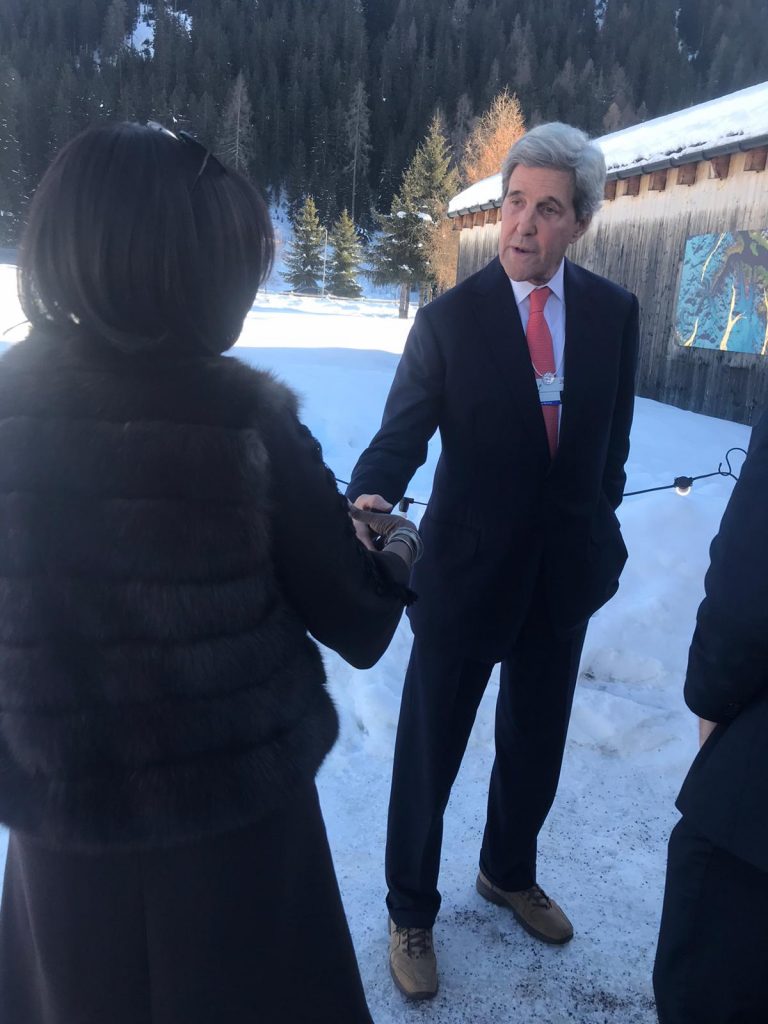
Mrs Saraki’s bilateral and multisector engagements included: Funding the Future 2.0 – to catalyse investments that deliver on health, as the guest of Devex, MSD for Mothers, U.S. International Development Finance Corporation and Credit Suisse; Beyond Boundaries – The Transformative Power of Education and Healthcare, as a guest of Global Citizen Forum and Malaika; Africa Outlook: Economics, Innovation and Governance as a guest of the Global Citizen Forum, and Accelerating the Sustainable Development Goals through National Leadership and Cross-sector Partnerships hosted by the Brookings Institute, the New York City Mayor’s Office for International Affairs and the United Nations Office for Partnerships.
Participating at the Rise Fund’s ‘Accelerating Impact – CEOs Leading The Charge Towards Positive Impact’, Mrs Saraki joined Jim Coulter, Maya Chorengel, and Steve Ellis at Davos House for the session, moderated by Alan Murray, president and CEO of Fortune, stating:
“I am hopeful that the private sector will rise to the challenge and work to urgently deliver the Sustainable Development Goals #SDGs”
“I was honoured to meet and engage with John Kerry, 68th United States Secretary of State, whose wise words resonated with me – we do have an obligation to protect the planet for our future generations, and we must deliver it urgently.”
“I very much enjoyed learning from the impact investing insights of Kelly Rinaudo, CEO of Zipline, Ken Njoroge, CEO Cellulant, Tom Davidson founder and CEO of EVERFI, Anne Finucane, Vice Chairman of Bank of America, and Anand Mahindra, Chairman of the Mahindra Group”
Mrs Saraki concluded her Davos participation with a high-level intervention at UNFPA, the United Nations Population Fund, Royal Philips (Philips) – Building a Global Private Sector Coalition for Women and Girls Health and Wellbeing. This engagement built on the recent High-Level Breakfast Roundtable held in Lagos, Nigeria, hosted by the Wellbeing Foundation Africa, in partnership with UNFPA. The roundtable convened private, philanthropic, and multi-sector stakeholders in Nigeria to secure a series of significant commitments towards the International Conference on Population and Development (ICPD) Three Zeros: zero unmet need for contraception; zero preventable maternal deaths; and zero gender-based violence and harmful practices.
NOTES TO EDITORS:
For further information please contact Presssecretary@wbfafrica.org
FROM January 19th, 2020
Sunday, 19th January, Malaga, Spain. Yesterday ahead of the Wellbeing Foundation Africa’s participation at the World Economic Forum Annual Meeting in Davos, H.E. Mrs Toyin Saraki, Founder- President of the Wellbeing Foundation Africa delivered a keynote speech on the need for urgency when implementing inventions to reduce maternal mortality to 75 senior employees of Ferrings Pharmaceuticals, including the full Executive Committee, Senior Vice Presidents, and General Managers from key markets.
During an interview with Curt McDaniel, Chief Legal Officer at Ferrings, Mrs Saraki discussed the destructive impact of post-partum Haemorrhage on women and families in Nigeria and across Sub-Saharan Africa; delivering improved and accessible health systems as a priority; and why health information in the hands of mothers is key to improving maternal outcomes.
“Although medicines are only part of the solution to strengthening health systems, they are a critical component. As a pharmaceutical group I am delighted that you have found a way to make certain maternal healthcare interventions affordable. However, I believe you should also see it as your responsibly to deliver these solutions to the people who need them the most. Through it was our political leaders that promised to deliver the sustainable development goals by 2030, we must all part of efforts, particularly in the private sector, to deliver them.” Mrs Saraki said.
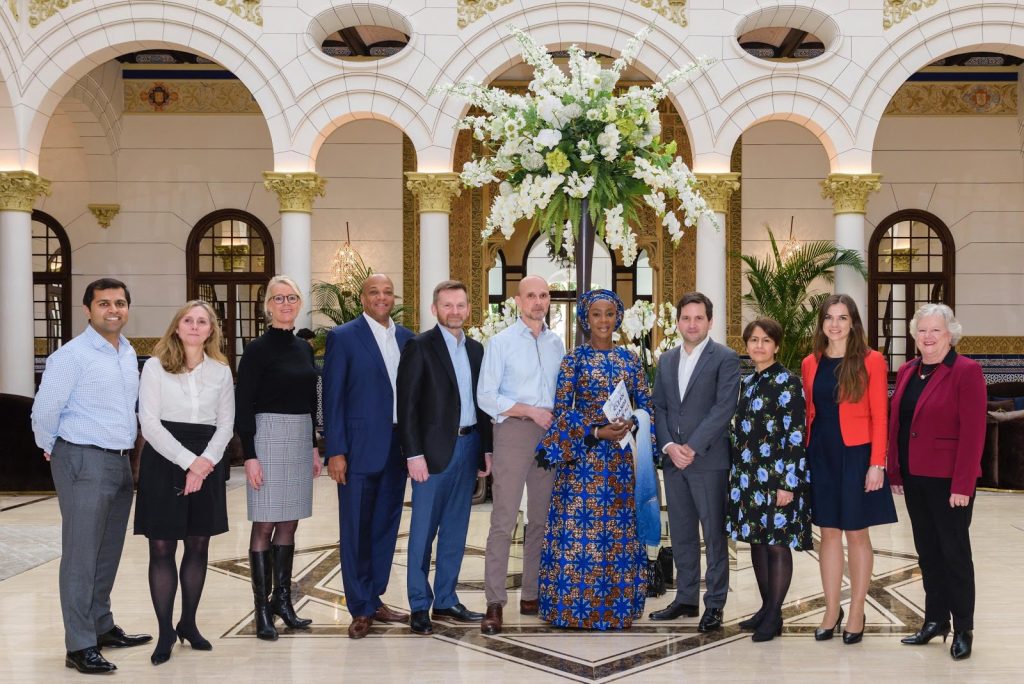
Nearly 20% of all global maternal deaths happen in Nigeria. In 2015, the country’s estimated maternal mortality ratio was over 800 maternal deaths per 100 000 live births, with approx. 58 000 maternal deaths during that year1, a leading cause of which is post-partum haemorrhage.
“Post-partum haemorrhage or excessive bleeding after birth is a sudden, terrifying condition, that thousands of women in my country die unnecessarily from. Maternal mortality is not only a colossal waste of life but remains a constant, and impenetrable barrier to development. When you are making strategic decisions about the feasibility of delivering certain life-saving medications to low and middle income countries, I urge you to build into your calculations the cost of a human life. We have the technology, we have the knowledge, we have the medicines, and we now need to urgently deliver the healthcare.”
“Health systems are primarily made up of people. When seeking to build strong healthcare, we must not neglect the importance of creating effective health-seeking behaviour. We know that some risks which increase maternal mortality can be reduced through a strong relationship between a mother and midwife. For example, a woman may perceive that she is in better control of the delivery process at home. A midwife can act as a strong advocate for facility-based delivery, meaning should a mother experience a complication she is more likely to access live-saving care in time.”
“As we commence the International Year of the Nurse and Midwife, I am encouraged that over 250,000 women have taken part in our midwifery services led MamaCare programme, Antenatal and Postnatal classes, delivered by a team of 55 midwives to mothers in healthcare facilities across Kwara, Ogun, Osun, Lagos, Kaduna states in Nigeria and the Federal Capital Territory. Our MamaCare mothers are now achieving the now standard number of antenatal eight visits recommended by the WHO, and we are yet to lose a single one to death in childbirth.”
As Wellbeing Foundation Africa Founder-President, Mrs Saraki is a Global Advocate for Water Sanitation and Hygiene in Health Care Facilities, who also serves as Global Goodwill Ambassador to the International Confederation of Midwives, Family Planning Champion to the United Nations Population Fund, and International Steering Committee member of the International Conference on Population and Development (ICPD). This week at the World Economic Forum Annual Meeting in Davos Mrs Saraki will be undertaking key advocacy activities to mobilise and unite whole system support for Midwifery, a frontline profession critical towards achieving healthy futures for childbearing women. The theme of this year’s annual meeting is: Stakeholders for a Cohesive and Sustainable World, which will focus on renewing the concept of stakeholder capitalism to overcome income inequality, societal division and the climate crisis.
NOTES TO EDITORS:
About the Wellbeing Foundation Africa
The Wellbeing Foundation Africa was founded in 2004 by Her Excellency Mrs Toyin Ojora Saraki, with the aim of improving health outcomes for women, infants and children. At the WBFA, we combine our programmes with advocacy work in Nigeria and around the world.
Over 250,000 women have taken part in our flagship ‘MamaCare’ classes in Nigeria. Despite dire national maternal mortality rates, we have not yet lost a single MamaCare mother. Our WBFA midwives transform the lives of mothers, their children and communities – and for whom no topic is off-limits.
Our Emergency Obstetric and Newborn Care (EmONC) programme is run in partnership with the Liverpool School of Tropical Medicine, the oldest and most established school of tropical medicine in the world, and Johnson & Johnson, one of the largest global health companies. We implement the EmONC training programme in Kwara State as part of a unique partnership model, bringing together an esteemed higher-education institution, the private sector, and a civil society organisation.
Our #MaternalMonday, #WASHWednesday, #ThriveThursday, and #FrontlineFriday campaigns were conceived as a platform for mothers, healthworkers, and our WBFA midwives to share their knowledge, experiences & best practice. The aim of that sharing exercise is to raise awareness for the improvement of reproductive, maternal, newborn, child & adolescent health; quality of frontline care; and water, sanitation, and hygiene infrastructure. Most importantly, we harness the power of story-telling on social media to share accurate information.
In 2017 we launched our sister organisation, Wellbeing for Women Africa. Harnessing the best and brightest minds around African development, Wellbeing for Women Africa elevates passionate young experts into decision-making spaces, whilst honing their craft as advocates through their editorial advocacy micro-grants programme. Please visit Wellbeing for Women Africa here: https://www.wellbeingwomen.org.
The WBFA’s programmes, which have since expanded to include water, sanitation and hygiene (WASH), Alive and Thrive and MamaCare+N – supported by global partners – inform its advocacy work, led by our Founder-President, H.E Mrs Toyin Ojora Saraki, who is a global champion for Universal Health Coverage, Special Advisor to the Independent Advisory Group (IAG) of the World Health Organisation’s (WHO) Regional Office for Africa (AFRO) and the inaugural Global Goodwill Ambassador for the International Confederation on Midwives (ICM).
About Ferring Pharmaceuticals
Ferring Pharmaceuticals is a research-driven, speciality biopharmaceutical group committed to helping people around the world build families and live better lives. Headquartered in Saint-Prex, Switzerland, Ferring is a leader in reproductive medicine and women’s health, and in speciality areas within gastroenterology and urology. Ferring has been developing treatments for mothers and babies for over 50 years and has a portfolio covering treatments from conception to birth. Founded in 1950, privately-owned Ferring now employs approximately 6,500 people worldwide, has its own operating subsidiaries in nearly 60 countries and markets its products in 110 countries.
FROM August 21st, 2019
Wednesday 21st August, Toyin Saraki, global advocate and Founder-President of leading women and children’s health organisation, the Wellbeing Foundation Africa, has welcomed the milestone of Nigeria being free of Wild Polio Virus for three years.
In a statement released by her office Mrs. Saraki stated:
“Today Nigeria marks a great milestone by reaching the three-year mark without any cases of the Wild Polio Virus (WPV). The last case of WPV was detected on 21st August in 2016, in Borno State. Since then, no new cases of WPV have been detected in any part of Nigeria. This is a major step towards certifying our country as WPV-free.”
“However, we must celebrate cautiously, and without complacency. To sustain this success, we must continue Polio mass immunization campaigns with the same great drive and commitment as before. This is vital in order to ensure that all children are protected against Polio, including the Circulating Vaccine Polio Virus (CVPDV) which can occur in areas with weak routine immunization coverage, and other vaccine-preventable diseases.”
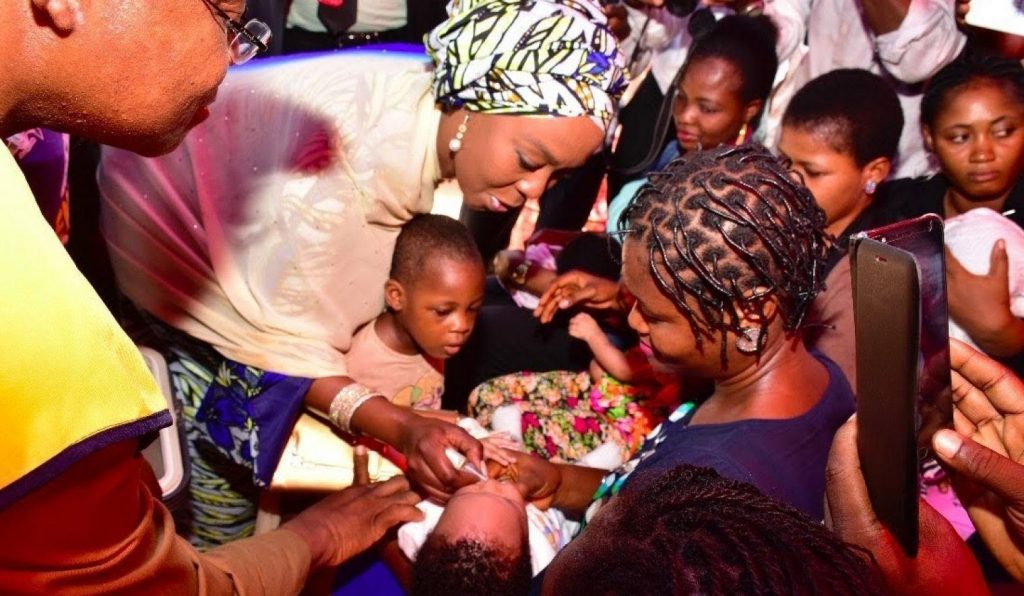
The Wellbeing Foundation Africa Foundation Founder recognised the significant contributions made towards the achievement of this milestone by the Bill and Melinda Gates Foundation and other important partners including the Aliko Dangote Foundation.
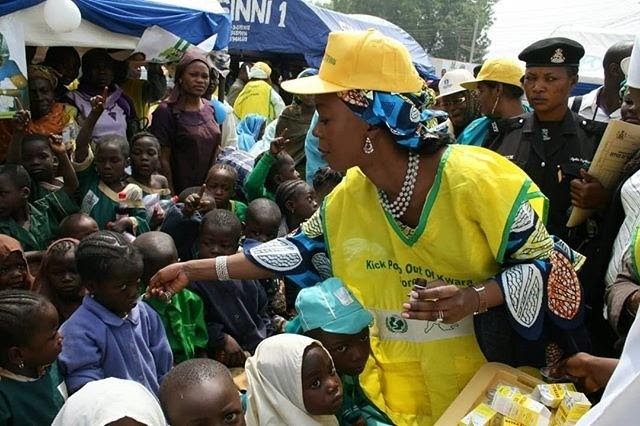
Mrs. Saraki reiterated that her organisation’s Maternal Monday social media advocacy campaign and MamaCare Frontline program are committed to supporting the immunisation work of the World Health Organisation Nigeria, the National Primary Health Care Development Agency, the Federal Ministry of Health, and the National Centre for Disease Control. Giving mothers access to information on the safety and importance of vaccines is a necessity in order to empower them to make immunisation choices in the best interests of their children.
Mrs. Saraki is a pioneering member of the Women Advocates to Vaccine Access (WAVA) initiative of the Johns Hopkins University (JHPIEGO).
FROM August 9th, 2019
Dear Partners, Supports, Colleagues and Friends,
As World Breastfeeding Week 2019 draws to a close, it is my pleasure to provide you with an update our work here at Wellbeing Foundation Africa. As ever, our midwives remain at the centre of our programs and advocacy activities. Last week we were proud to launch our new ‘Neonatal Intensive Care Lactation Support Pilot Program’, and I had the opportunity to meet with the leadership team at the Chelsea and Westminster Hospital NHS Foundation Trust.
Thank you to all of my colleagues and partners who continue to make our impact possible. As ever, please do not hesitate to get in touch with any of your thoughts, feedback or ideas. We are always learning from one another.
With many thanks,
Toyin Saraki
Founder-President, Wellbeing Foundation Africa
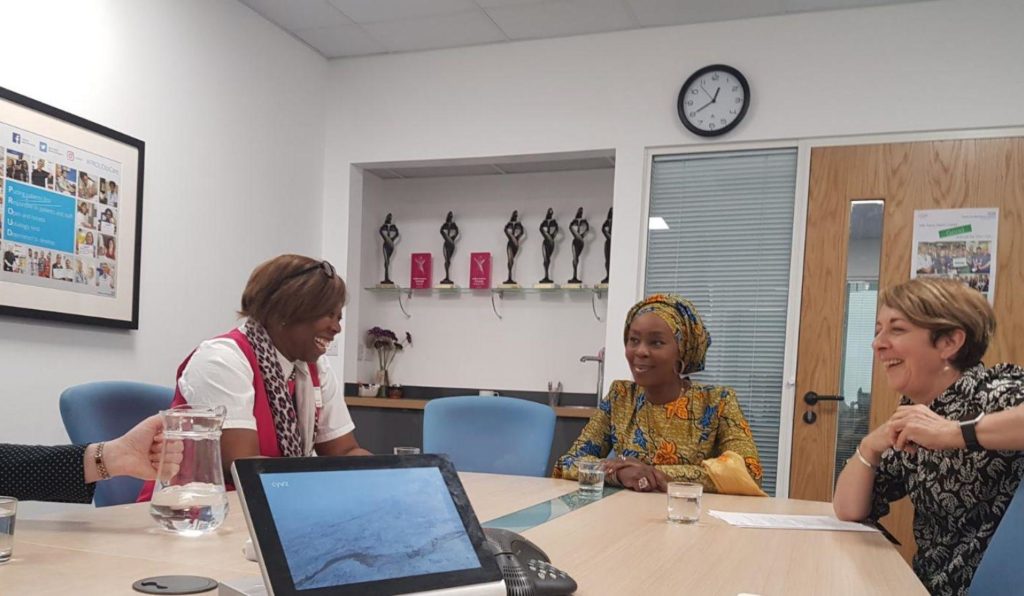
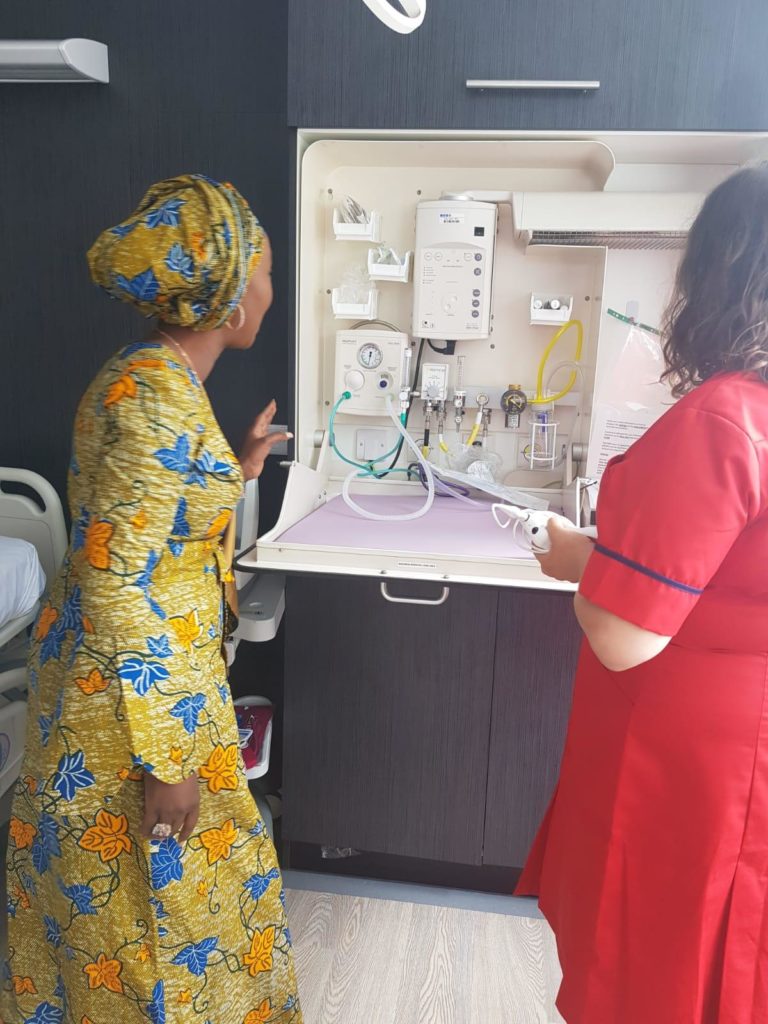
As World Breastfeeding Week 2019 drew to a close yesterday, Toyin Ojora Saraki conducted an official visit to the maternity ward of the Chelsea and Westminster Hospital NHS Foundation Trust. In her meetings with senior staff, including Zoe Penn, Medical Director, Victoria Cochrane, Director of Midwifery, Gubby Ayida, Medical Director of Women’s Services, and Kerry Huntington, Fundraising Director of ’CW +’ which acts as the official charity of the NHS Foundation Trust, Mrs Saraki explored how the 12,000 women a year who give birth at the Chelsea and Westminster Hospital are cared for. Mrs Saraki was keen to learn more about the hospital’s midwifery-led system wand and obstetric model of care, which includes specialist support for more complex pregnancies and health conditions with a foetal medicine unit.
Mrs Saraki, whose Wellbeing Foundation Africa is partners with the Liverpool School of Tropical Medicine Centre for Maternal and Newborn Health’s Emergency Management of Obstetric And Newborn Care Simulation Skills Program in Nigeria, had been invited to visit the hospital in light of her “extensive experience, passion and global standing” in the field of midwifery, and as Global Goodwill Ambassador for the International Confederation of Midwives (ICM), and Special Adviser to the Independent Advisory Group of the World Health Organization Regional Office for Africa.
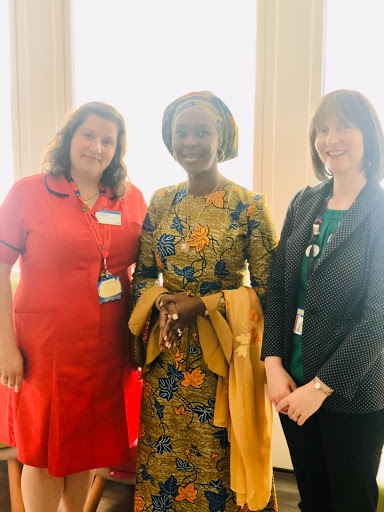
Following the meetings and tour of the hospital, Mrs Saraki commented:
“I commend the Chelsea and Westminster Hospital NHS Foundation Trust for its superb, midwife-led maternity care. I was struck today not only by the excellent standards that women can expect at the hospital, but also by the culture of respect that is ubiquitous amongst staff.”
“I am impressed to observe the workings of primary, secondary and tertiary specialist referrals providing an unbroken continuum of maternity care, as an essential core of universal health coverage services.”
“At the Wellbeing Foundation Africa, our MamaCare midwives also lead the way with quality care, saving many lives and helping women and infants to thrive. I look forward to working with the Chelsea and Westminster Hospital NHS Foundation Trust to share “research bench to bedside” best-practice models of maternity services, and bring the best possible standards of care to women all over the world – no matter where they give birth.”
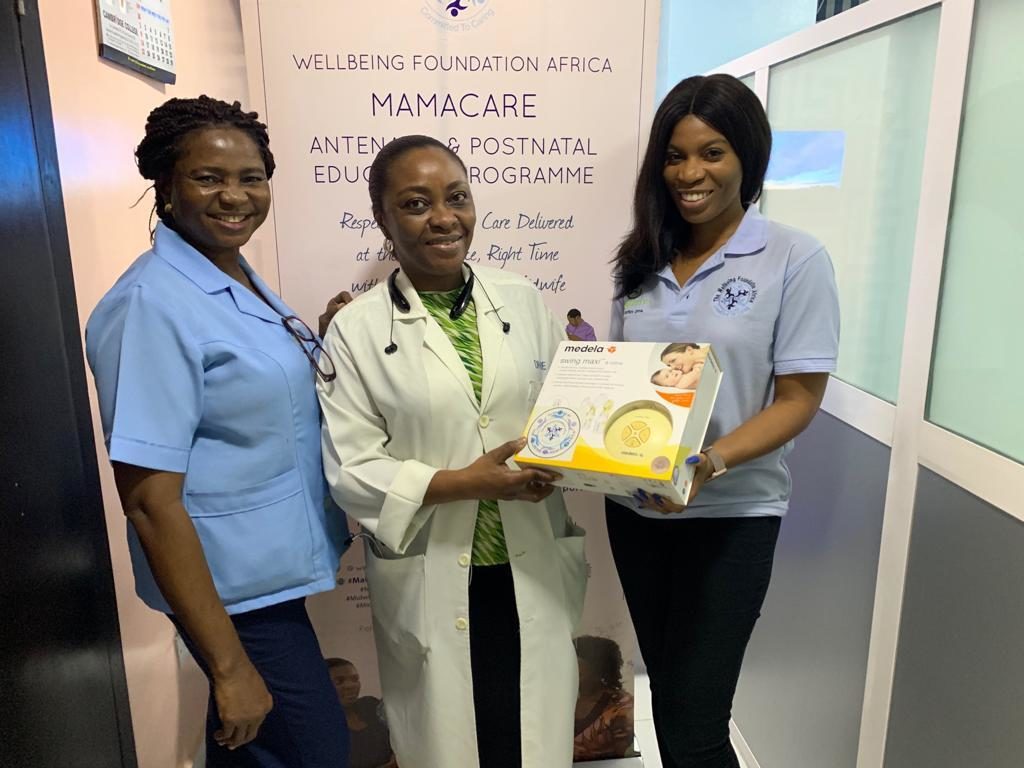
Mrs Saraki’s visit coincided with World Breastfeeding week, during which the Wellbeing Foundation Africa launched its ‘Neonatal Intensive Care Lactation Support Pilot Program.’ The WBFA’s midwives support and promote the World Health Organisation’s Ten Steps To Breastfeeding in 655 health centres and hospitals across its Mamacare, Mamacare+N and Alive and Thrive Infant and Young Child Feeding, birth preparedness, antenatal and postnatal education programmes.
The Foundation donated breastfeeding equipment to the Neonatal Intensive Care Units of medical facilities in Lagos, Kwara and Kaduna States and Abuja. This will help the facilities to provide optimal neonatal intensive care feeding for premature and sick infants, this will ensure that fragile neonates may more easily benefit from the immunity provided from colostrum, which serves as the first immunity for newborns.
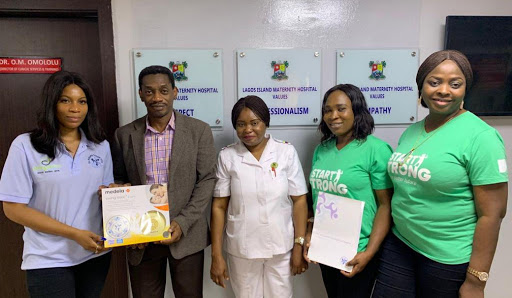
Since 2011, the WBFA’s midwives have supported and promoted the World Health Organisation’s Ten Steps To Breastfeeding in 655 health centres and hospitals across its Mamacare, Mamacare+N and Alive and Thrive Infant and Young Child Feeding, birth preparedness, antenatal and postnatal education programmes. Our programmes promote infant and young child nutrition from multiple levels and channels, creating a baby-friendly environment, conducive to optimal mother and baby breastfeeding practices.
Through institutional and community advocacy, along with one-on-one and class based interpersonal communication, counsel and care, the Wellbeing Foundation Africa continues to overcomes barriers to early and exclusive breastfeeding. We strive to improve the diets and frequency of meals in young children in Nigeria.
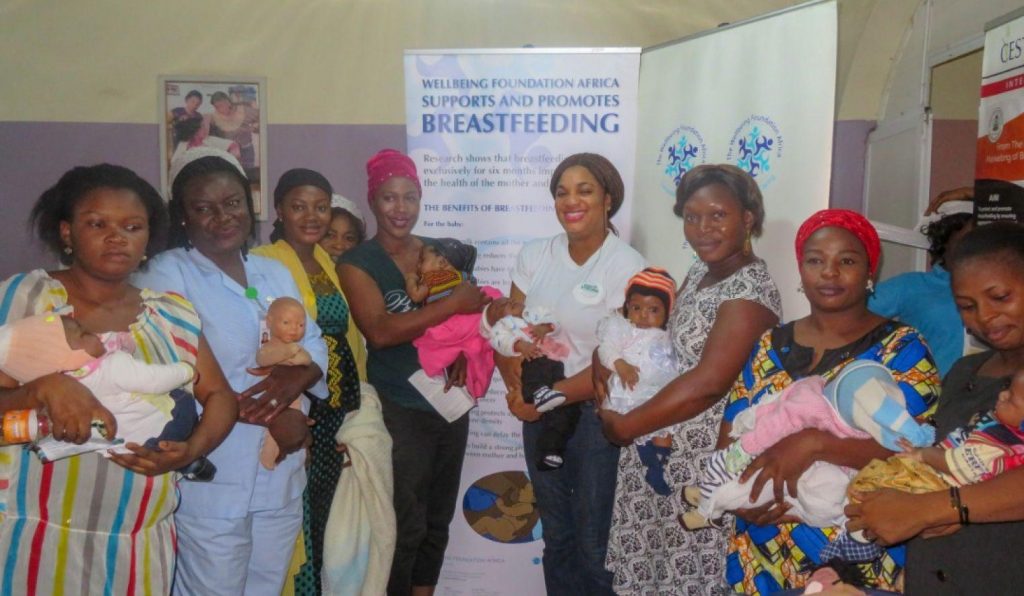
he Wellbeing Foundation Africa continues to harness global research findings related to human milk and breastfeeding into innovative breastfeeding support programs.
Through new scientific discoveries surrounding the anatomy of the lactating breast and how the infant removes milk from the breast, the Wellbeing Foundation Africa is committed to developed set of solutions to support Neonatal Intensive Care Units (NICUs) in providing milk and improving breastfeeding.
The Wellbeing Foundation Africa understands the challenges of providing milk in the NICU. Both from the from the mother’s side, where there can be a struggle to produce an adequate milk supply, and from the infant’s side, as babies may experience challenges ingesting the milk..
The NICU Lactation Support Pilot Program is directed towards obtaining human milk, promoting human milk feeding, and supporting all infants in achieving breastfeeding as early as possible.
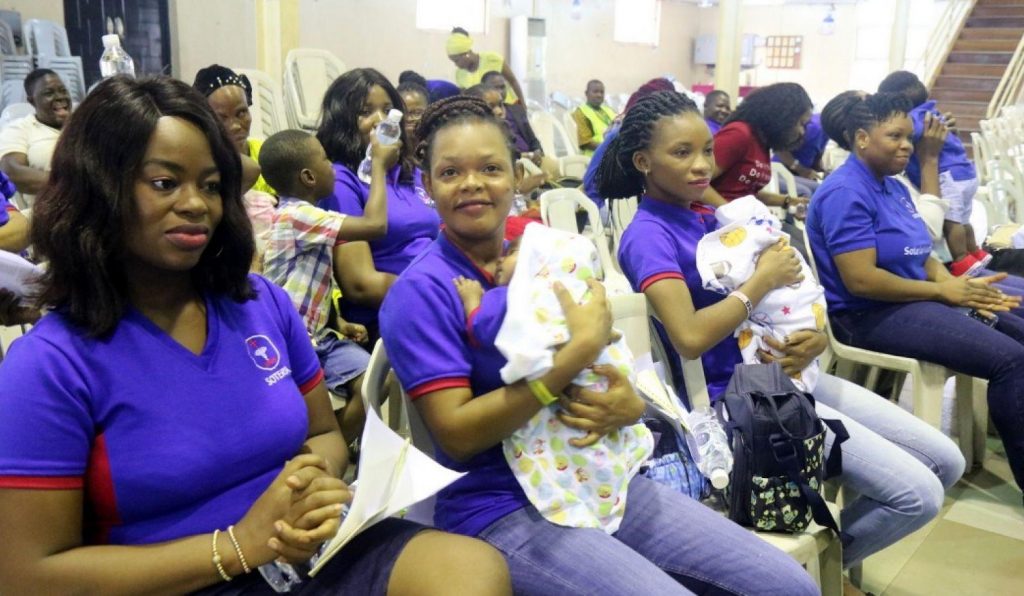
Our goal is to provide research-based products, together with the educational materials, is to overcome the difficulties associated with human milk provision.
This World Breastfeeding Week, which has the theme “Empower Parents; Enable Breastfeeding”, we have donated state-of-the-art Medela products to a number of facilities. These facilities include Lagos Island Maternity, Omotayo Hospital and Lifeline Children’s Hospital in Lagos State, Bwari General Hospital and Maitama General Hospital in Abuja, University of Ilorin Teaching Hospital and General Hospital Ilorin in Kwara State, and Giwa Hospital in Kaduna State.
In her statement, the Founder-President of the Wellbeing Foundation Africa, H.E. Mrs Toyin Ojora Saraki, commented:
“The Wellbeing Foundation Africa is pleased to be donating these Medela products to the Neonatal Intensive Care Units of these selected hospitals across Lagos, Kwara, Kaduna States and Abuja. This is part of our foundation’s goal to improve newborn health across the country, reducing neonatal mortality.”
“I am pleased to support this NICU Pilot in Nigeria to promote early (within the first 48 hours of life) buccal administration of mother’s own milk, and specifically colostrum, to reduce rates of Necrotising Enterocolitis, late onset invasive infections, and mortality in preterm infants.”
“We are also keen on building on the successes of our MamaCare Antenatal and Postnatal Education programme and the Alive and Thrive Infant and Young Child Feeding programme this World Breastfeeding Week, both of which have significantly contributed to the improvement of newborn nutrition, especially the promotion of early initiation to breastfeeding, exclusive breastfeeding for the first six months and proper complimentary feeding after six months.”
“We are encouraged by the progress achieved through our various programmes and we are determined to use this World Breastfeeding Week to carry out more milestone projects, of which this donation to healthcare facilities across the country is just one. It is our responsibility as stakeholders to provide strategic solutions to the challenges of stunting, wasting, under-weight and general malnutrition in infants and young children, and ensure their healthy growth and development. The Wellbeing Foundation Africa recognizes and promotes the importance of breast milk for premature and sick neonates as the first and optimal nutrition in fragile situations.”
FROM August 8th, 2019
As World Breastfeeding Week 2019 drew to a close yesterday, Toyin Ojora Saraki conducted an official visit to the maternity services of Chelsea and Westminster Hospital NHS Foundation Trust. In her meetings with senior staff, including Zoe Penn, Medical Director, Victoria Cochrane, Interim Director of Midwifery, Gubby Ayida, Medical Director of Women’s Services, and Kerry Huntington, Fundraising Director of ‘CW +’ which acts as the official charity of the NHS Foundation Trust, Mrs Saraki discussed how the 12,000 women a year who give birth at the Trust are cared for in a midwifery-led system which also provides an obstetric model of care, including specialist support for more complex pregnancies and health conditions with a foetal medicine unit.
Mrs Saraki, whose Wellbeing Foundation Africa is partner to the Liverpool School of Tropical Medicine’s Centre for Maternal and Newborn Health’s Emergency Management of Obstetric And Newborn Care Simulation Skills Program in Nigeria, had been invited to visit the hospital in light of her “extensive experience, passion and global standing” in the field of midwifery, as Global Goodwill Ambassador for the International Confederation of Midwives (ICM), Founder-President of the Wellbeing Foundation Africa and Special Adviser to the Independent Advisory Group of the World Health Organization Regional Office for Africa.

Following the meetings and tour of the hospital, Mrs Saraki commented:
“I commend the Chelsea and Westminster Hospital NHS Foundation Trust for its superb, midwife-led maternity care. I was struck today not only by the excellent standards that women can expect at the hospital, but also by the culture of respect that is ubiquitous amongst staff.”
“I am impressed to observe the workings of primary, secondary and tertiary specialist referrals providing an unbroken continuum of maternity care, as an essential core of universal health coverage services.”

“At the Wellbeing Foundation Africa, our MamaCare midwives also lead the way with quality care, saving many lives and helping women and infants to thrive. I look forward to working with the Chelsea and Westminster Hospital NHS Foundation Trust to share “research bench to bedside” best-practice models of maternity services, and bring the best possible standards of care to women all over the world – no matter where they give birth.”
Mrs Saraki’s visit coincided with World Breastfeeding week, during which the Wellbeing Foundation Africa launched its ‘Neonatal Intensive Care Lactation Support Pilot Program.’ The WBFA’s midwives support and promote the World Health Organisation’s Ten Steps To Breastfeeding in 655 health centres and hospitals across its Mamacare, Mamacare+N and Alive and Thrive Infant and Young Child Feeding, birth preparedness, antenatal and postnatal education programmes.
This week the Foundation donated breastfeeding equipment to the Neonatal Intensive Care Units of medical facilities in Lagos, Kwara and Kaduna States and Abuja, to help healthcare facilities provide optimal neonatal intensive care feeding for premature and sick infants, ensuring that fragile neonates may more easily benefit from the immunity provided from colostrum, which serves as the first immunity for newborns
FROM August 7th, 2019
Since 2011, The Wellbeing Foundation Africa’s Mamacare midwives have supported and promoted the World Health Organisation’s Ten Steps To Breastfeeding in 655 health centres and hospitals across its Mamacare, Mamacare+N and Alive and Thrive Infant and Young Child Feeding, birth preparedness, antenatal and postnatal education programmes, to enable and empower infant and young child nutrition from multiple levels and channels, creating a Baby Friendly environment, conducive to optimal mother and baby breastfeeding practices.
Through institutional and community advocacy, along with one-on-one and class based interpersonal communication, counsel and care, the Wellbeing Foundation Africa overcomes barriers to early and exclusive breastfeeding, improving the diets and frequency of meals in young children in Nigeria.

As part of the week-long activities to mark this year’s World Breastfeeding Week, the Wellbeing Foundation Africa today donated breastfeeding equipment to the Neonatal Intensive Care Units of selected medical facilities in Lagos, Kwara and Kaduna States and Abuja, FCT to bring this year’s event to a conclusion. These donations are aimed at mitigating the challenges health facilities face with regards to providing optimal neonatal intensive care feeding of premature and sick infants, ensuring that fragile neonates may more easily benefit from the immunity provided from colostrum, which serves as the first immunity for newborns.
The Wellbeing Foundation’s Mamacare Program Baby Friendly Initiative Programs are committed to enhancing mother and baby health through the life-giving benefits of breastmilk. During this time, the Foundation has focused on understanding mothers’ needs and infants’ behaviour. The health of both mothers and their infants during the precious breastfeeding period is at the centre of all activities.

The Wellbeing Foundation Africa continues to harness global research findings into human milk and breastfeeding, and incorporates the outcomes into innovative breastfeeding support programs.
Through new discoveries surrounding the components of human milk, the anatomy of the lactating breast and how the infant removes milk from the breast, the Wellbeing Foundation Africa has committed to providing a developed set of solutions to support Neonatal Intensive Care Units (NICUs) in providing human milk and improving breastfeeding.
The Wellbeing Foundation Africa understands the challenges of providing human milk in the NICU, from the mother’s side to reach an adequate milk supply and from the infant’s side to ingest the milk; plus issues of hygiene and logistics.
The Neonatal Intensive Care Unit Lactation Support Pilot Program is directed towards obtaining human milk, promoting human milk feeding, and supporting all infants in achieving breastfeeding as early as possible.
The Wellbeing Foundation Africa’s Neonatal Intensive Care Lactation Support Program aims to provide the most recent, evidence-based knowledge to support breastfeeding and human milk use in the NICU. The goal of the innovative, research-based products, together with the educational materials, is to overcome the difficulties associated with human milk provision in the NICU.

This World Breastfeeding Week, which has the theme “Empower Parents; Enable Breastfeeding”, the Wellbeing Foundation Africa has provided state-of-the-art Medela products to these facilities. The facilities that will be benefitting from this donation include Lagos Island Maternity, Omotayo Hospital and Lifeline Children’s Hospital in Lagos State, Bwari General Hospital and Maitama General Hospital in Abuja, University of Ilorin Teaching Hospital and General Hospital Ilorin in Kwara State, and Giwa Hospital in Kaduna State.
In her statement, the Founder-President of the Wellbeing Foundation Africa, H.E. Mrs Toyin Ojora Saraki, commented:
“The Wellbeing Foundation Africa is pleased to be donating these Medela products to the Neonatal Intensive Care Units of these selected hospitals across Lagos, Kwara, Kaduna States and Abuja. This is part of our foundation’s goal to improve newborn health across the country, reducing neonatal mortality.”
“I am pleased to support this NICU Pilot in Nigeria to promote early (within the first 48 hours of life) buccal administration of mother’s own milk, and specifically colostrum, to reduce rates of Necrotising Enterocolitis, late onset invasive infections, and mortality in preterm infants.”

“We are also keen on building on the successes of our MamaCare Antenatal and Postnatal Education programme and the Alive and Thrive Infant and Young Child Feeding programme this World Breastfeeding Week, both of which have significantly contributed to the improvement of newborn nutrition, especially the promotion of early initiation to breastfeeding, exclusive breastfeeding for the first six months and proper complimentary feeding after six months.”
“We are encouraged by the progress achieved through our various programmes and we are determined to use this World Breastfeeding Week to carry out more milestone projects, of which this donation to healthcare facilities across the country is just one. It is our responsibility as stakeholders to provide strategic solutions to the challenges of stunting, wasting, under-weight and general malnutrition in infants and young children, and ensure their healthy growth and development. The Wellbeing Foundation Africa recognizes and promotes the importance of breast milk for premature and sick neonates as the first and optimal nutrition in fragile situations.”
Malnutrition accounts for more than 50% of under-five mortality in states across Nigeria. Infant Mortality rate is at 103 per 1000 live births (NDHS 2013), while under-5 mortality rates are at 169 per 1000 live births (NDHS 2013). The rate of timely breastfeeding initiation is 28.9% (MICS 2017), with only 19.7% of children being exclusively breastfed (MICS 2017), and only 10% of children aged 6 – 23 months were fed appropriately. Within the State, 11.7% of children are wasted from acute under nutrition, 47% of children under-5 years are stunted, while 34% are under weight (MICs 2017).